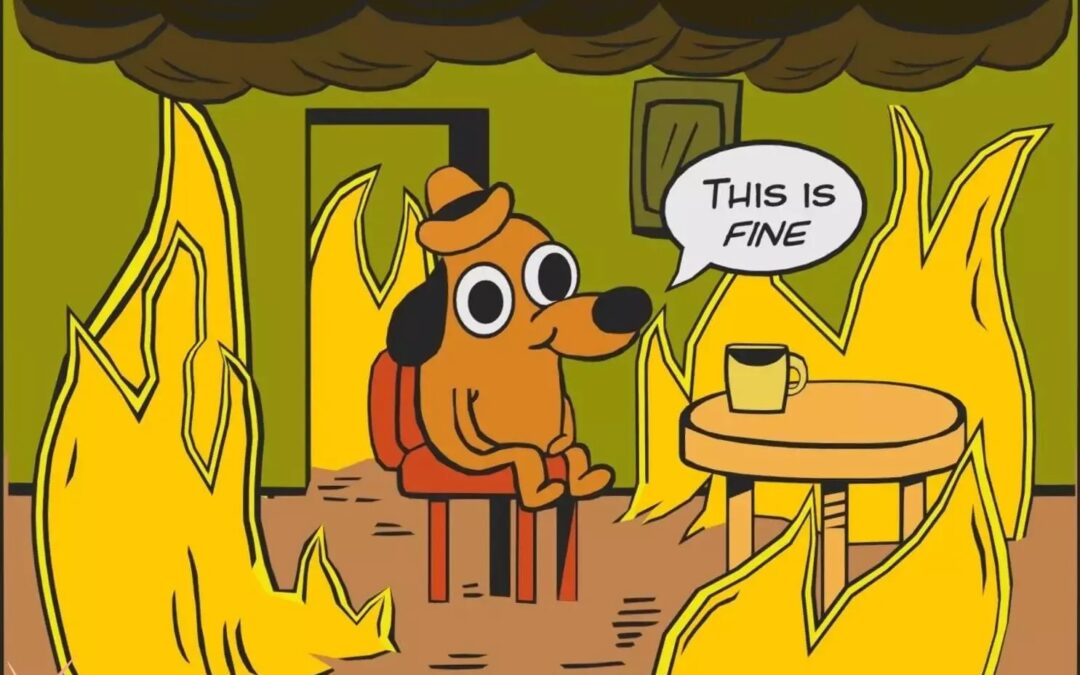Image credit: KC Green’s web comic strip “On Fire”
The current political climate, where racist and transphobic narratives and policies become stronger here and abroad, has had many therapists (re)-reflecting on the place and role of therapy. It’s not just therapists either, I often hear from clients that therapy feels indulgent when there’s so much bad stuff happening in the world. Years ago, I remember saying a version of this to my therapist. When the world is on fire*, what value might therapy have? Can therapy and activism co-exist? This blog is my attempt to answer that.
Is therapy about ‘fixing’ the individual and ignoring social problems?
A long-standing criticism of therapy has been that it’s about working on (‘fixing’) the individual and their ‘maladaptive’/’disordered’/’problematic’ responses in isolation, whilst ignoring the social and environmental issues which have led to their ‘mental ill health’ or symptoms. Shoring up a world view where, as Taylor put it, ‘I’m the problem, it’s me’. But is therapy still like this? Is it just a car crash of individualism? Yes, sometimes, it has the potential to be, but that also depends significantly on the type of therapy and therapist.
Psychiatry and psychotherapy have a long and problematic history of labelling marginalised populations as disordered (see its history relating to queer and trans people, racism and misogyny in mental health systems). In our current political climate, there will be a push to bring back this role for mental health professionals, which anti-oppressive therapists must be aware of and resist.
What might it look like when activism and therapy co-exist?
However, an alternative role for therapy is also possible, where it has the potential to be something which boosts marginalised people’s knowledge, self-awareness and confidence. This is something I know first-hand. It’s interesting to me that the habit of using negative labels for myself relating to my ‘mental ill health’ is something I used to do *before* therapy. Now I know how trauma, attachment, and prejudice lead to responses in the nervous system and what I can do about it when it does. As a result of this, I talk about myself and my responses (mostly) compassionately. People with low self-esteem, with no idea of how their nervous system works or how to settle it down when it’s in a survival response, are very easy to manipulate. Interrupting that pattern is a lot of why I do therapy.
I also reject the idea that we have to choose between therapy and activism, as if the therapy hour somehow expands to mean that no other activity is possible in our lives. Therapy can be beneficial for activism because it has the potential to move us out of a state of survival stress, so we are able to think clearly, connect with others and resource ourselves. I think this is what Peter Levine (the originator of Somatic Experiencing) was getting at when he said:
“True human enlightenment will only happen when each and every single person on the planet has learned how to regulate their very own nervous system.”
Without self-reflection and healing we are likely to arrive in activism communities and begin re-enacting trauma patterns, dysfunctional relationships, pushing ourselves past capacity and burning out. If we’re not putting on our own oxygen mask first, the amount we can help others is limited and the quality of the help we can offer is reduced.
An alternative, anti-oppressive role for therapy
So, what might it look like when therapy doesn’t just blame the individual for the impact of social problems? Can therapy support activism rather than being an alternative to it? Some thoughts on what anti-oppressive therapy might look like in practice:
– The therapist keeps an eye on how the environment the person is living in is affecting them and helps clarify that responses of anger, fear and distress are normal human responses to bad treatment and prejudice. When someone is experiencing abuse or mistreatment, the problem isn’t them or their responses, it’s the treatment they receive. Of course, there may also be times when something the person is doing is contributing to the problem or situation, and part of therapy is untangling that too.
– Information/psychoeducation is shared around concepts such as attachment, survival responses and the nervous system to help understanding, empowerment and self-awareness.
– The therapist has an awareness of the power dynamics within therapy and is taking stock of their own privilege and how it might come up in the therapy room. Whilst we can’t completely remove power imbalance between client and therapist, but we can work to reduce and acknowledge it. Therapists should recognise that they are human, capable of getting it wrong, and that sometimes a problem in therapy might be because of something they’re doing (rather than always transference, or resistance, or a problem with the client). Part of the reason I like Relational Therapy so much is because it’s based around the idea that what happens in the therapy room isn’t just about the client, it’s about the client and therapist.
– The therapist makes space for joy, rest and survival as an act of political resistance.
“Caring for myself is not self-indulgence, it is self-preservation, and that is an act of political warfare.”― audre lorde
-They see marginalised lives as valuable and interrupt any internalised prejudice that there is something inherently wrong with us.
Want to explore this further?
If you’re interested in finding out more about how therapy can support you and your activist work, get in touch. I offer a free 20-minute meeting to see if we’d be a good fit to work together.
Further reading
The Dynamics of Power in Counselling and Psychotherapy Ethics, Politics and Practice – Gillian Proctor
Intersections of Privilege and Otherness in Counselling and Psychotherapy – Dwight Turner
Decolonizing Therapy – Oppression, Historical Trauma, and Politicizing Your Practice Jennifer Mullan
*becoming less of a metaphor


Recent Comments